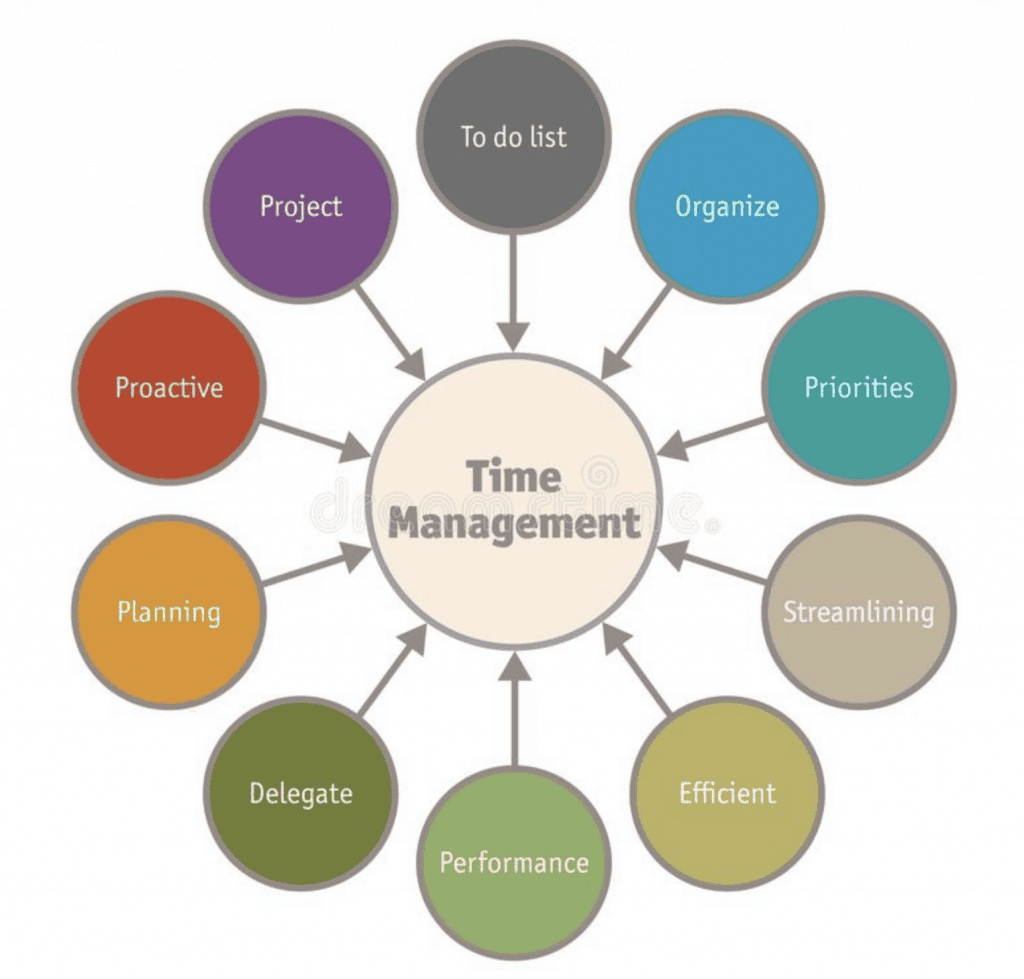Time management Skills at Workplace
|
Getting your Trinity Audio player ready...
|
Time Management Skills at Workplace
What are time management skills in a workplace?
Soft Skills Time management skills are basically the ability to manage your time properly. You can use this skill at home or in an office. This includes knowing how to prioritize tasks, meet deadlines and effective goal setting.
Time management is important because you may miss out on something if you don’t manage your time appropriately! These skills will help you become a more productive employee, and will ultimately allow you to do a better job.
Some people believe that once they have the basic skills that time management requires, they can just wing it from then on. This is usually not the case. If you really want to improve your time management techniques, keep reading below for some tips to get started!
Time Management Skills are very important for any individual, especially if they work in a professional field. Professionals have to handle multiple tasks at one time, each with their own deadlines which need to be met. This is possible only if you have the right Time Management skills. You can enhance your working abilities and improve your results with the help of these skills.
Is Time Management A Soft Skill?
Time management is definitely a soft skill! As we mentioned before, it’s the ability to properly manage your time. This includes things like knowing how to prioritize tasks, meeting deadlines, and setting effective goals. All of these are essential skills to have in any workplace. If you can master them, you’ll be well on your way to becoming a more productive and successful employee.
Effective time management skills:
Effective Time Management Soft Skills are a necessity for all those who work in various different professional fields, as they have to handle multiple tasks simultaneously. If you have the right set of skills you can save yourself from a lot of stresses and work towards achieving your goals. Below mentioned are some effective time management skills which will help you make the most out of your time.
Organization and Prioritization Skills:
One of the most important aspects of effective time management is learning how to organize and prioritize your tasks. This involves being able to identify what tasks are the most important and need to be completed first. It’s also important to be able to break down larger tasks into smaller, more manageable ones. This will make it much easier to get through your to-do list and avoid feeling overwhelmed.
Goal-Setting Skills:
Another important skill to have is the ability to set effective goals. This means knowing what you want to achieve and then creating a realistic plan to make it happen. It’s also important to be able to track your progress and adjust your goals as needed. This will help you stay on track and motivated to keep working towards your goals.
Communication Skills:
Another key time management skill is effective communication. This involves being able to share information clearly and concisely with others. It’s also important to be able to listen to others and understand their needs. This will help you avoid misunderstandings and wasted time.
Stress Management Skills:
Last but not least, effective stress management skills are also essential for good time management. This involves being able to identify and deal with sources of stress in a healthy way. It also includes learning how to manage your time so that you don’t feel overwhelmed by your tasks. This will help you stay calm and focused so that you can be more productive.

How to improve time management skills?
So you’re looking for ways to improve your time management within the next week at work ? Here are 12 tips that will help you do just that!
1. Creating routines
It is important to establish a routine so that your day goes more smoothly. When trying to improve time management skills, you should get into a routine of sorts. Once it becomes part of your daily life, you won’t have to think about it so much and you will be able to manage your time more effectively.
2. Prioritize
In order to better manage your time at work, you must learn how to prioritize properly. Many people try to tackle more than one task at once, and end up having little success with any of them. Next time you’re faced with more than one project, prioritize what needs to be done first and do that first!
3. Use a planner
One of the best ways to improve time management skills is to use a planner. When you write down your goals, they suddenly become more attainable.
4. Learn to say no
One of the biggest problems with time management at work is that you are trying to take on too many tasks at once! You need to learn when it is appropriate to say no when someone asks for your assistance. If you want to improve time management skills, this might be the most important tip of all!
5. Set goals
It is important to set goals in order to make sure that you are working steadily towards something. You can accomplish so much more when you have a goal in mind and work towards it at all times!
6. Prioritize the task at hand
Another excellent tip on how to improve time management skills is to prioritize the task at hand. It’s very easy to become overwhelmed by everything that you need or want to accomplish, but if you focus on one thing first there will be less chance of being overwhelmed later.
By prioritizing the task at hand, you will be able to work more efficiently and accomplish even more than what you thought possible!
7. Take a break
If you feel as though your attention span is getting shorter and you are having trouble focusing, it might be time to take a break. Take five minutes out of your work day to stretch or fetch yourself a drink.
8. Don’t multitask
You cannot do two things at once. You will get nowhere fast if you try to focus on more than one thing at once, which leads us to our next point.
9. Focus!
It is so easy to become distracted these days with all of the gadgets and technology available, but it’s important that you learn how to block out distractions in order to improve your time management skills.
10. Organize your desk
It can be difficult to concentrate on your work when you look at a cluttered and messy desk every day. Make the time to clean up before you start working! You will find yourself able to focus more clearly on one task at hand when things are organized around you.
Another tip on how to improve time management skills is to organize your desk. This might not seem like it would help much, but you would be surprised by how great of a difference it can make!
11. Break down big projects
Break large projects into small tasks and prioritize those tasks as well! It can be such a pain to start something and realize that it’s too large of a task to handle. By breaking it down into smaller tasks, you can accomplish what is needed more easily.
12. Start your day off right
It is important that you start your work day off properly by getting organized and ready for the tasks ahead. You will be surprised by how much easier it will be to accomplish what you need if you start your morning right.
13. Group similar tasks:
If you have several tasks that are similar, try to group them together! This will make it easier to complete them and will help improve your time management skills.
14. Set a timer:
If you find yourself working on a task for too long, set a timer! This will help keep you on track and make sure that you don’t spend more time than necessary on any one task.
15. Take advantage of down time:
There are always going to be lulls in your work day, so make sure that you take advantage of them! These moments can be used to catch up on small tasks or even just take a few minutes to yourself.
16. Delegate when possible:
In order to improve your time management skills, it is important to learn when to delegate. If you have too much on your plate, ask for help from a coworker or friend.
17. Set Boundaries:
In order to effectively manage your time, it is important to set boundaries. This means learning to say “no” when necessary and setting limits on how much you are willing to do.
By getting organized and ready for the day, you’ll soon find that time management at work is no longer a problem!

Time management skills for managers:
A manager is a professional who performs various tasks to meet the organizational goals. Time management is an essential skill for managers since they are constantly required to complete several tasks in limited time. However, effective time management is important for each and every individual in all walks of life including students, teachers etc.
Effective time management involves planning, organizing and scheduling the work. In addition to this, it also includes various other activities including prioritizing of tasks and setting of goals among others. All these processes help in maximizing the benefits from time spent on a certain task.
Time management skills for students:
Students are often faced with lack of planning when it comes to managing their time. They usually have to go through the monotonous routine of attending classes and preparing for examinations. Time management skills can help students in not only organizing their work but also in managing limited time available.
The ability to manage time efficiently helps students in utilizing limited resources completely. Some of the benefits of good time management include saving on expenses, reducing stress levels among others. Good time management also helps students in creating a balance between studies and relaxation.
Students are often faced with lack of planning when it comes to managing their time. They usually have to go through the monotonous routine of attending classes and preparing for examinations. Time management skills can help students in not only organizing their work but also in managing limited time available.
Time management skills for teachers:
Teachers across the world often complain about lack of time to complete their everyday tasks including marking, planning and preparation among others. In order to help themselves as well as their students, they require effective time management skills. Teachers who know how to manage their time well are able to utilize their resources to the fullest and work towards achieving organizational goals.
Managing time for teachers is critical since they need to handle a number of tasks simultaneously. Furthermore, these tasks also have various deadlines which can be met only with effective time management skills. Some of the benefits associated with efficient time management include saving expenses, reducing stress levels among others.
Time management in business :
Time-management in business is a very important aspect. When a company has to deal with multiple clients, the demands on time become even stricter. Many different methods can be used in order to manage your time well and follow up on all tasks that have been assigned to you. Achieving this will not only improve your results but also keep you ahead of your competitors.
Time management in project management :
Time Management is an integral part of Project Management, as there are many different tasks that have to be performed at the same time. Each task has to be considered carefully so that you don’t miss out on any details, and complete everything on time. This will help you to stay ahead of your schedule and deliver results that are worth the efforts.
Important Tasks:
Prioritizing your tasks is the key to effective time management. You need to identify the most important tasks and work on them first. This will help you in completing all your tasks within the set timeframe. In addition to this, it will also help in avoiding any last minute rush.
Setting Goals:
Goal setting is another important step in time management. When you have set a goal, you are more likely to work towards it and achieve it within the set timeframe. This will help you in improving your productivity levels and obtaining better results.
Deadlines:
Many times, we are unable to meet deadlines because we do not have an effective time management system. When you are aware of the deadlines and have planned accordingly, it becomes easier to achieve them. In order to stay organized, you need to create a list of all the deadlines and work on them accordingly.
Staying Focused:
In order to complete tasks on time, it is important that you focus on the task at hand. When you are working on a number of tasks simultaneously, it becomes difficult to focus on any one of them. This can be avoided by dividing the work into smaller parts and completing them one at a time.
Eliminating Distractions:
Distractions can often prevent us from completing our tasks on time. There are many distractions that can occur while we are working, such as phone calls, emails and internet browsing. To eliminate these distractions, you need to devise a plan and work accordingly. In this way, you will be able to focus on your work and complete it within the set timeframe.
Tools and Techniques:
There are various tools and techniques that can help you in managing your time better. These tools can be used to schedule your tasks, set deadlines and prioritize your work. In addition to this, there are also various apps that can be used for time management.
The Pomodoro Technique:
The Pomodoro Technique is a popular time management technique that helps you to stay focused on your work. This technique involves working for a set period of time and then taking a break. This helps in avoiding distractions and completing tasks within the set timeframe.
Note Taking:
Note taking is another important tool that can be used for time management. When you are working on a project, it is important to take notes so that you don’t forget any details. This will help you in completing the project on time and within the set budget.
Tracking Progress:
Progress tracking is another important aspect of time management. When you are working on a project, it is important to track your progress so that you can identify any areas where you need to improve. This will help you in completing the project on time and within the set budget.
Meeting Agendas:
Meeting agendas are another important tool that can be used for time management. When you are conducting a meeting, it is important to have a list of all the topics that need to be discussed. This will help you in stay focused on the meeting and avoid any distractions.
E-mail Management:
E-mail management is another important aspect of time management. When you are dealing with a large number of emails, it is important to prioritize them so that you can respond to the most important ones first. In addition to this, you should also try to reduce the number of emails that you receive by unsubscribing from unnecessary lists.
Calendars:
Calendars are another useful tool that can be used for time management. Calendars can be used to track deadlines, schedule tasks and monitor progress. In addition to this, calendars can also be used to share information with team members.
Task Lists:
Task lists are another important tool that can be used for time management. Task lists help you in organizing your work and keeping track of all the tasks that need to be completed. In addition to this, task lists can also be used to share information with team members.
Time Blocking:
Time blocking is another popular time management technique. This technique involves dividing your day into blocks of time and then allotting a specific task to each block. This helps in avoiding distractions and completing tasks within the set timeframe.
The Eisenhower Matrix:
The Eisenhower Matrix is a popular time management technique that helps you to prioritize your tasks. This technique involves classifying your tasks into four categories – urgent and important, not urgent and important, urgent and not important, and not urgent and not important. This helps you in identifying the most important tasks and completing them first.
The 80/20 Rule:
The 80/20 rule is a popular time management technique that helps you to prioritize your tasks. This rule states that 80% of the results are generated by 20% of the effort. This means that you should focus on the 20% of the tasks that are most important and leave the rest for later.
Delegation:
Delegation is another important aspect of time management. When you are working on a project, it is important to delegate tasks to other team members so that you can focus on the most important tasks. This will help you in completing the project on time and within the set budget.
The Pomodoro Technique, note taking, tracking progress, meeting agendas, e-mail management, calendars, task lists, time blocking, The Eisenhower Matrix, and The 80/20 Rule are some of the most popular time management techniques. These techniques can be used to stay focused on your work and complete tasks within the set timeframe. Try out these techniques and see which ones work best for you.
Work Life Balance:
Another important aspect of time management is work life balance. This is necessary in order to avoid burnout and maintain a healthy lifestyle. When you have a good work life balance, you are able to complete your tasks without compromising on your personal life.
Consequences of Poor Time Management Skills:
There are various consequences of poor time management. Some of these include missing deadlines, poor quality of work, low productivity levels, and stress. In addition to this, poor time management can also lead to health problems such as anxiety and depression.
- Missing deadlines: This can have a negative impact on both your personal and professional life. If you miss deadlines at work, it can lead to you losing your job or getting demoted. In your personal life, missing deadlines can lead to missed opportunities and disappointment from others.
- Poor quality of work: When you don’t manage your time well, you rush through tasks and don’t put in the effort that is needed to produce high-quality work. This can lead to errors and mistakes, which can be costly in both your personal and professional life.
- Low productivity levels: When you don’t use your time wisely, you don’t get as much done as you could. This can lead to feelings of frustration and overwhelm. In addition, it can also cause you to miss out on opportunities to advance in your career or enjoy your personal life.
- Stress: When you’re constantly rushing and feeling like you’re behind, it takes a toll on your mental and physical health. This can lead to a host of problems such as anxiety, depression, headaches, and even heart disease.
Project Management Tools:
Project management tools can be used to help you plan, track, and execute your projects. These tools can be used to create project timelines, set deadlines, and assign tasks. In addition, they can also be used to track progress and ensure that projects are completed on time.
Time Management Apps:
There are various time management apps that can be used to help you in your day-to-day life. These apps can be used to track your time, set goals, and reminders. In addition, they can also be used to monitor your productivity levels and help you stay on track.
Final Thoughts and Recap:
Time management is an important skill that can help you in achieving your goals. When you have mastered the art of time management, you will be able to complete all your tasks within the set timeframe. In addition to this, you will also be able to improve your productivity levels and obtain better results.
Now that you know some of the most important time management skills, it’s time to start working on developing them. Remember, these skills take time and practice to master. But if you’re patient and persistent, you can develop them and see a real difference in your productivity.
A right time management solution will depend on the specific needs of the individual. However, there are some general tips that can be used to improve your time management skills.
Set realistic goals: One of the most important things you can do is to set realistic goals. When you set goals that are too high, you’re setting yourself up for failure. Instead, focus on setting achievable goals that you can actually accomplish.
Create a schedule: Another helpful tip is to create a schedule and stick to it. This will help you to plan your day and make sure that you’re using your time wisely.
Eliminate distractions: One of the biggest time wasters is distractions. Whether it’s social media, emails, or phone calls, these things can eat up a lot of your time. Make a conscious effort to eliminate distractions and focus on the task at hand.
Take breaks: It’s important to take breaks throughout the day in order to avoid burnout. When you’re feeling overwhelmed, take a few minutes to yourself to relax and rejuvenate.







